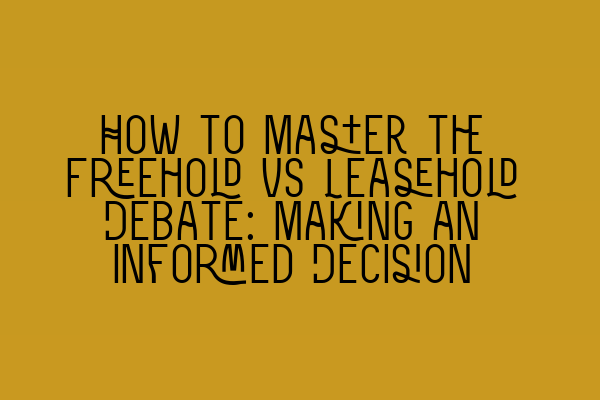How to Master the Freehold vs Leasehold Debate: Making an Informed Decision
Welcome to the SQE Property Law & Land Law blog, where we aim to provide you with expert insights and guidance on all aspects of property law. In today’s post, we will be exploring the freehold vs leasehold debate and providing you with essential information to help you make an informed decision. Whether you are a first-time buyer, an investor, or simply interested in property law, this article is for you.
Understanding the Basics: Freehold and Leasehold
Before we dive into the intricacies of the freehold vs leasehold debate, let’s start by clarifying what these terms actually mean. In simple terms, freehold refers to owning the property and the land it sits on outright, with no time restrictions on ownership. On the other hand, leasehold means that you own the property for a fixed period of time, typically between 99 and 999 years, but you do not own the land itself.
Now that we have a basic understanding of these concepts, it’s time to explore the advantages and disadvantages of each option to help you make an informed decision.
The Pros and Cons of Freehold
When considering freehold, it’s important to keep in mind the following advantages:
- Complete Ownership: With freehold, you have complete control and ownership over the property, giving you the freedom to make any alterations or improvements without seeking permission from a landlord.
- No Ground Rent: Unlike leasehold, freehold properties do not come with ground rent obligations, which means you won’t have to worry about making regular payments to a landlord.
- Investment Potential: Freehold properties typically have better investment potential, as they tend to appreciate in value more consistently over time.
However, freehold does come with a few downsides:
- Maintenance Responsibility: As the owner of a freehold property, you are solely responsible for the maintenance and repair costs, including any communal areas if applicable.
- Higher Upfront Costs: Freehold properties usually have higher upfront costs compared to leasehold, so you’ll need to consider this when budgeting for your property purchase.
The Pros and Cons of Leasehold
Leasehold properties also offer certain advantages:
- Lower Upfront Costs: Leasehold properties typically have lower upfront costs, making them more accessible for first-time buyers or those on a tighter budget.
- Shared Maintenance: In a leasehold arrangement, the responsibility for maintenance and repair costs may be shared with other leaseholders, reducing the financial burden on an individual.
- Additional Benefits: Some leasehold properties, particularly flats, come with additional benefits such as access to communal facilities or amenities.
However, it’s important to be aware of the potential downsides of leasehold:
- Ground Rent and Service Charges: Leasehold properties typically involve the payment of ground rent and service charges to the landlord or management company, which can increase over time.
- Restrictions on Alterations: As a leaseholder, you may need to seek permission from the landlord or management company before making any alterations to the property.
- Lease Expiry: At the end of the lease term, the property ownership reverts back to the freeholder, unless you are able to negotiate an extension or buy the freehold.
Making Your Informed Decision
Now that we have explored the advantages and disadvantages of both freehold and leasehold, it’s time to consider your specific circumstances and preferences to make an informed decision. Here are a few factors to consider:
- Your Long-Term Plans: If you are planning to stay in the property for a significant period of time and have the financial means to do so, freehold may be a more suitable option.
- Budgetary Constraints: If you are working with a limited budget and looking for more affordable upfront costs, leasehold might be a better fit.
- Property Type: Certain property types, such as flats, are more commonly leasehold, so it’s important to consider the norms and regulations associated with the specific property type you are interested in.
It’s also highly recommended to seek professional legal advice when considering property purchases, as a solicitor specializing in property law can help you navigate the complexities of the process and ensure you make an informed decision that aligns with your interests and goals.
At SQE Property Law & Land Law, our team of experienced solicitors is ready to assist you every step of the way. Contact us today to schedule a consultation and let us guide you through the freehold vs leasehold debate.
For further reading on related topics, we recommend checking out our other articles:
- SQE Contract Law: Analyzing Landmark Cases and Influential Judicial Decisions
- Understanding Contractual Capacity: Rights and Limitations
- Interactive SQE Mock Tests for Contract Law: Test Your Knowledge
- Join Our SQE Contract Law Webinars: Expert Insights and Guidance
- SQE Prep: Mastering the Essentials of Contract Law
We hope this article has shed some light on the freehold vs leasehold debate and provided you with valuable information to make an informed decision. Remember, when it comes to property law, knowledge is power, and we are here to empower you.
